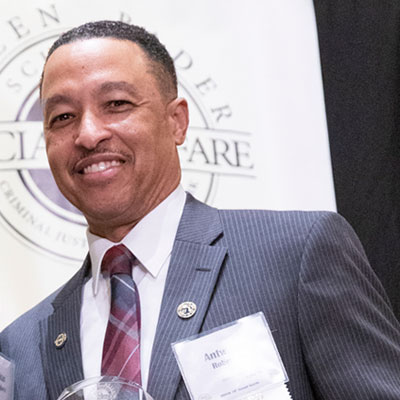
Antwayne Robertson, MSW
I feel like our job is to share ourselves with others. The best advice I can give to current and future students is to be true to yourself, your heart and try not to compromise.
Why did you want to study social work?
It was a calling based on my growing up experience. I was always attracted to working and connecting with people and trying to be helpful. I think, looking back at the types of relationships I’ve had – I always cared about people and kids and what’s best for them. I was always sensitive as a child to what my friends went through. I grew up in a single family household on AFDC, what public assistance was called in the 60s, and I remember being treated differently. When I lived on 13th and Ring (Milwaukee), I would frequent the corner store on Burleigh to purchase milk and bread. The store owner would direct me to the back of the line to allow “paying customers” to go first. I would wait until all paying customers were gone before he would allow me to purchase. He called food stamps “funny money.” These type of experiences shaped who I am today.
Social Work was a natural fit, but it was a journey. As I would say, “I took the scenic route.” When I attended school in Eau Claire, I was thinking about becoming a lawyer. Then I tried history, and then business administration, but nothing fit. I recall my advisor asked me to take an interest test and with the results of that she recommended that I take social work, psychology and sociology. Subsequently, I found my natural niche. Those courses made sense and touched a core. I think that my upbringing and life experience had an impact on my interest, compassion and focus.
Where do you currently work?
I am the director of the Waukesha County Department of Health and Human Services. I have been with Waukesha County since 2004, but in my current position since 2013.
What has been the best social work job you had and why?
My best social work experiences can be described in phases. When I worked in group homes and a residential facility, I really loved working with youth males. They taught me about relationships, trust and the importance of having family connections. Many of these youths did not have a supportive family and many ended up aging out of the system with nothing but the clothes on their backs. The resiliency of these young men taught me a lot; how to create a healthy family in their own way and how to survive with minimum guidance and support. When I came to Waukesha County as a social worker in 1986, in the Adolescent and Family Services Division, I worked with youth who struggled with school attendance (truancy) and who exhibited destructive behavior (drug and alcohol abuse, running away and suicidal tendencies). Working with these individuals and hearing their stories — these were survival stories. Many of these youths were either physically abused, sexually abused or severely neglected. Their behavior was a cry for help. They would challenge me every step of the way. You had to earn their trust. If you can offer and create a culture of security and comfort consistently, you can earn their trust.
When I was a supervisor and a site manager with the state branch of the Bureau of Milwaukee Child Welfare, from 1996-2004, I worked with impoverished families whose children were confronted with chronic neglect and substance abuse. At that time, many parents were addicted to crack cocaine. It was the families’ ability to overcome all these barriers to be reunified with their children that reinforced my reason to be in this profession. Being a public servant in Waukesha County has allowed me to foster relationships with community based organizations, the business community and other governmental agencies. Strengthening the county’s service delivery system allows us to maximize resources to ensure the safety of children, vulnerable adults and the well-being of families.
How did HBSSW help you?
First of all, it was the instructors. I was very fortunate to have quality instructors and ad hoc instructors who were committed to my professional development. I have a long-lasting relationship with Professor Gwat-Yong Lie. To me, she epitomizes the mission and vision of the social welfare program. I have been fortunate and blessed to be a part of it. I believe the culture of this program provided me a sense of community. Everyone felt a part of something bigger with a common goal. Even though the program provides diverse areas of study, there’s a common goal that we’re here to help others. That was a wonderful experience.
What is your best advice for social work students?
“The meaning of life is to find your gift; the purpose of life is to give it away.” I feel like our job is to share ourselves with others. The best advice I can give to current and future students is to be true to yourself, your heart and try not to compromise. What I mean by “not to compromise,” do not compromise why you wanted to be in this profession from the beginning. I understand serving individuals/families can be complicated, but always remember you take one person, one child, one family at a time and give each your best. Even though there are societal challenges and influences, never give up and be a strong advocate for your profession and those you serve.
Where is Antwayne Robertson now?
Antwayne Robertson was director of the Waukesha County Department of Health and Human Services for 16 years prior to his retirement. He now works at Cardinal Stritch University in the Master’s in Educational Leadership program.